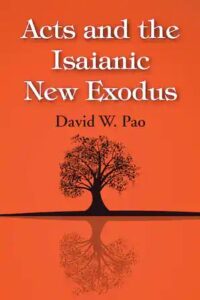Book Review: Acts and the Isaianic New Exodus
 In his book Acts and the Isaianic New Exodus, David W. Pao presents a challenging and enriching look at the book of Acts. Pao recognizes the importance of the Old Testament in understanding the New Testament. He argues that the book of Isaiah, with its heavy emphasis on the exodus theme, supplies the hermeneutical framework for Acts.
In his book Acts and the Isaianic New Exodus, David W. Pao presents a challenging and enriching look at the book of Acts. Pao recognizes the importance of the Old Testament in understanding the New Testament. He argues that the book of Isaiah, with its heavy emphasis on the exodus theme, supplies the hermeneutical framework for Acts.
Most Bible students recognize the importance of the exodus. One finds allusions to God’s merciful deliverance of His people from bondage throughout the Old Testament. Jeremiah, Ezekiel, and Hosea frequently referred to the exodus to rebuke sinful Israel but also to encourage God’s people with the promise of deliverance even greater than the exodus. The Psalmist refers to the exodus story as well (Ps. 78). The exodus theme plays an important role in the book of Isaiah, especially in chapters 40-55. Pao says, “In Isaiah, this story (the exodus theme DE) provides an identity for the exilic community during the rebuilding of the community of God’s people. Similarly, in the development of the identity of the early Christian movement, the appropriation of ancient Israel’s foundation story provides grounds for a claim by the early Christian community to be the true people of God in the face of other competing voices. I will argue that this scriptural story illuminates the meaning of both the early chapters of Acts and the travel narrative that occupies the second half of the story” (p. 5).
Pao considers Isaiah 40:1-11 to be the “hermeneutical lens” without which Luke’s writings (gospel and Acts) cannot be properly understood. He believes this passage functions as a prologue to Isaiah 40-55. Pao suggests this section consists of four distinct parts, and these four parts serve as introductions to the various emphases of Isaiah 40-55. The four parts are as follows: the restoration of the people of God (40:1-2), the universal revelation of the glory/salvation of God (40:3-5), the power of the word of God and the fragility of the people (40:6-8), and the restoration of the people of God (40:9-11). This fourth part is not a new theme but forms a link between 40:1-8 and 40:12-31. In the remaining part of his book, Pao traces how these four parts are enlarged in Isaiah 40-55 and then more fully developed in Luke-Acts.
In chapter three, Pao shows how specific Isaianic statements are used at critical points in Luke’s writings to provide the meaning for the development of the story in Acts. He concentrates on five passages (Lk. 4:16-30; 24:44-49; Acts 1:8; 13:46-47; 28:25-28). He goes into detail on each passage, explaining its importance in God’s plan to save man, as found in Acts.
Pao discusses the restoration of Israel in chapter four. He argues that there are several interrelated themes concerning this restoration that are found throughout Isaiah and especially in 40- 55. He lists the themes as follows:
- the reconstitution of Israel
- the ingathering of the exiles
- the community of the Spirit
- the rebuilding of the Davidic Kingdom
- repentance and the turn to the Lord
- the inclusion of the outcasts
Pao believes that all six of these themes are found within Acts. He argues that the fulfillment of these themes in Acts demonstrates the early church understood that they were the true extension of the people of God.
Chapter four traces the importance of the word of God to the early Christian movement. It is entitled “The Agent of the New Exodus: The Word of God.” In his conclusion to this chapter, Pao says, “In this chapter, I have shown that the word of God in the narrative of Acts is an active agent that travels to the ends of the earth. The goal of the journey is to conquer the world and to create a community as the true people of God” (p. 176).
In chapter six, Pao discusses the problem of idolatry as mentioned in Isaiah 40-55 and throughout Acts. He affirms the sovereignty of God over all idols of man. In chapter seven, he concludes with the importance of the concern for the Gentiles in both Isaiah and Acts.
Acts and the Isaianic New Exodus is a valuable book in many ways. First, it helps the reader to better understand God’s great plan of redemption. It is particularly helpful in understanding Acts. Second, it builds on the exodus theme, which flows throughout the Bible. Third, it demonstrates the importance of Old Testament books (especially Isaiah) in interpreting New Testament themes. Last, although it does not appear to try to answer popular dispensational themes, it does a good job of showing that the promises made to Israel in the Old Testament are fulfilled in the new era that began in Acts. The early Christians were to be considered the people of God—the true Israel. Pao’s book can be challenging to read, but it is worth the effort.
Book Information
Author: David W. Pao
Publisher: Wipf & Stock
ISBN:9781498299435
Originally Published: 2000
Book Review written by: Doug Edwards | doug.deb.edwards@gmail.com